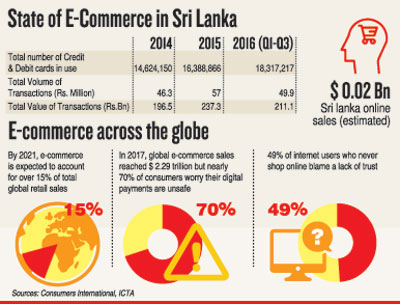News
Consumer Affairs Authority needs to go digital: Official
The Consumer Affairs Authority (CAA) Act of 2003 needs to undergo significant reforms to meet contemporary digital consumer needs, said an official of the Legal Draftsman’s Department.
Ms Yamuna Ranawana of the Department said the CAA Act was enacted at a time of the traditional consumer and much has changed since then, with regard to consumer patterns.
“Certain functions of the CAA such as its power to give directions to the traders and manufacturers in respect of price marking and labelling, determining standards and specifications relating to goods and supply of services, complaints receiving process, display of price lists and issue of receipts, are some of the areas which need to be revamped,” she said.
Ms Ranawana expressed these views during a session titled ‘Legal Framework for Safe Digital Consumer’, which was part of a two-day National Public-Private Dialogue held recently on ‘Making Digital Market Places Fairer’.
Information & Communication Technology Agency (ICTA) Legal Advisor Jayantha Fernando said that Sri Lanka is ranked No.1 in South Asia, in Networked Readiness Index (NRI), and is among the top 10 developing and transition economies which show ‘e-commerce readiness’. It is also classed as a nation with ‘medium readiness’, by the UN Conference on Trade & Development (UNCTAD) B2C E-commerce Index 2017. “Despite this recognition, as a country, we need to do a lot more to ensure digital consumer protection,” Mr. Fernando noted.
The ICTA Legal Chief called for “continuous review and reform of law and policies” which will enhance consumer protection and benefit the consumer in the digital age. He said the Electronic Transactions Act (ETA), Payment & Settlement Systems Act, Ratification of the UN ECC (UN Convention on the Use of Electronic Communications in International Contracts) and the Budapest Cyber Crime Convention are among the most notable instruments and interventions which provide an enabling legal environment to facilitate digital commerce in the country.
He added that, amendments to the ETA brought last year, provide greater confidence to consumers in e-Commerce.
Canadian ITC expert Dr. Michael Geist, with global experience in e-commerce and expertise in e-commerce law, who attended the sessions, said international e-commerce rules, best practices and regulatory interventions on consumer protection, emphasized the freedom of expression, which should be championed for the consumers. “Part of consumer rights is the right to complain,” said Dr. Geist, who was quick to add that, this does not, however, warrant false and baseless allegations against sellers. “Dispute resolution, which is also core to consumer protection, also calls for increased interventions,” added the e-commerce expert.

